Campaign 2024
Get up-to-date 2024 Campaign news from our reporters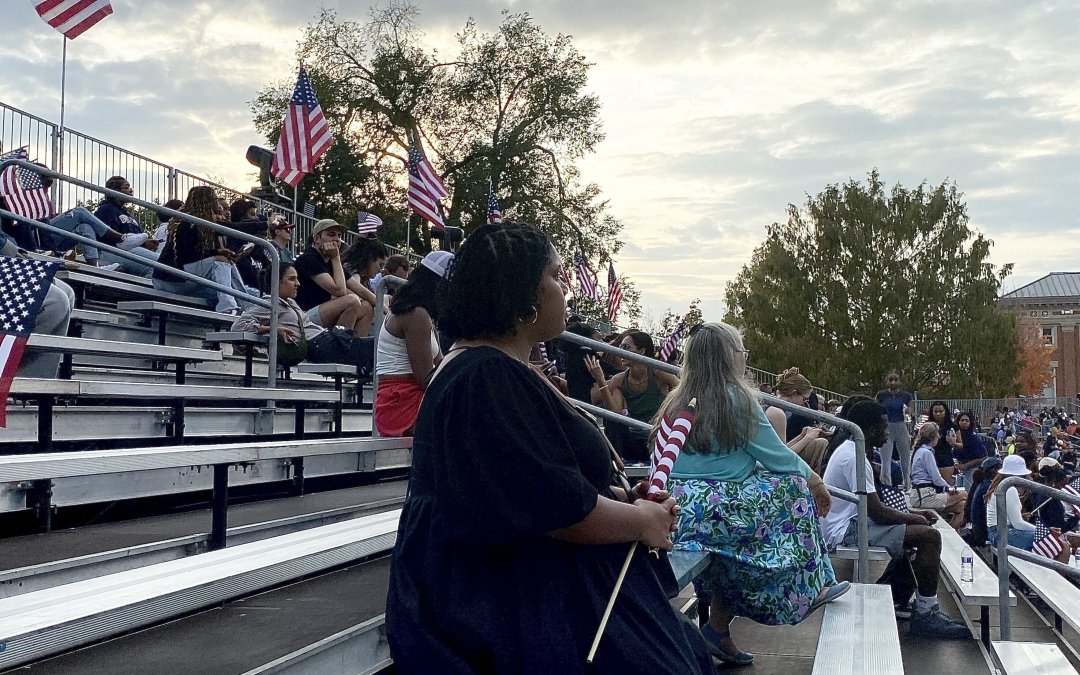
Is “moving to Canada” the solution? Harris supporters weigh in
We talked to Harris supporters disappointed with the Democrats’ presidential race loss to see if they truly want to move to Canada, given the popular online discourse.
read more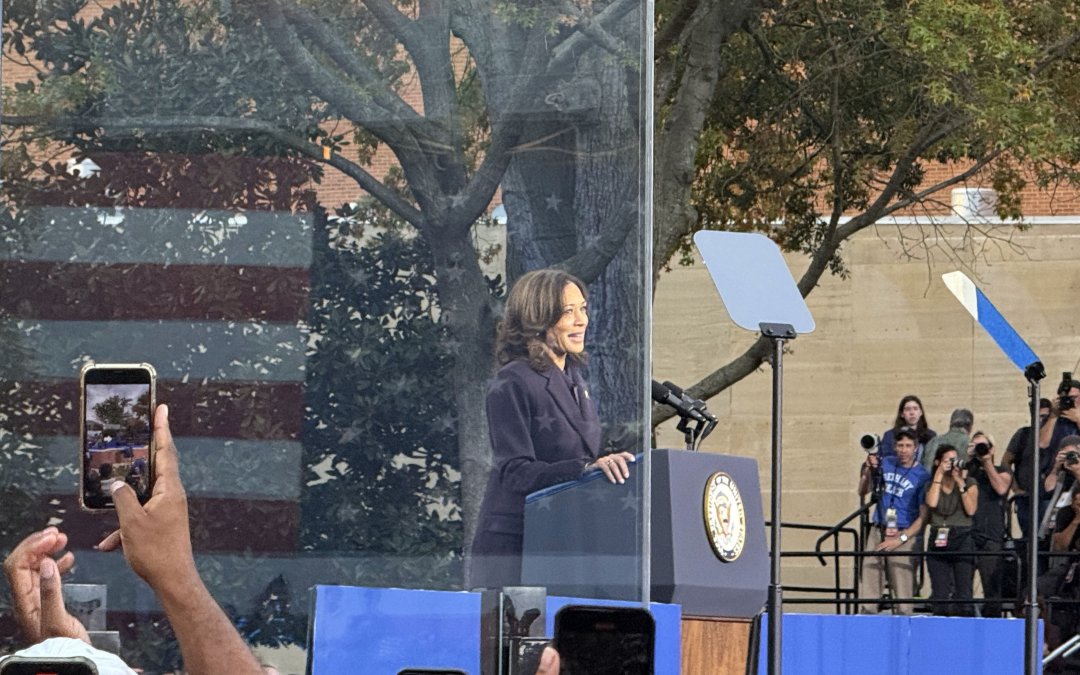
Harris delivers hopeful message for young supporters in concession speech
In her concession speech at Howard University Wednesday, Kamala Harris addressed young supporters, highlighted hope and resilience while emphasizing that the fight for progress continues.
read more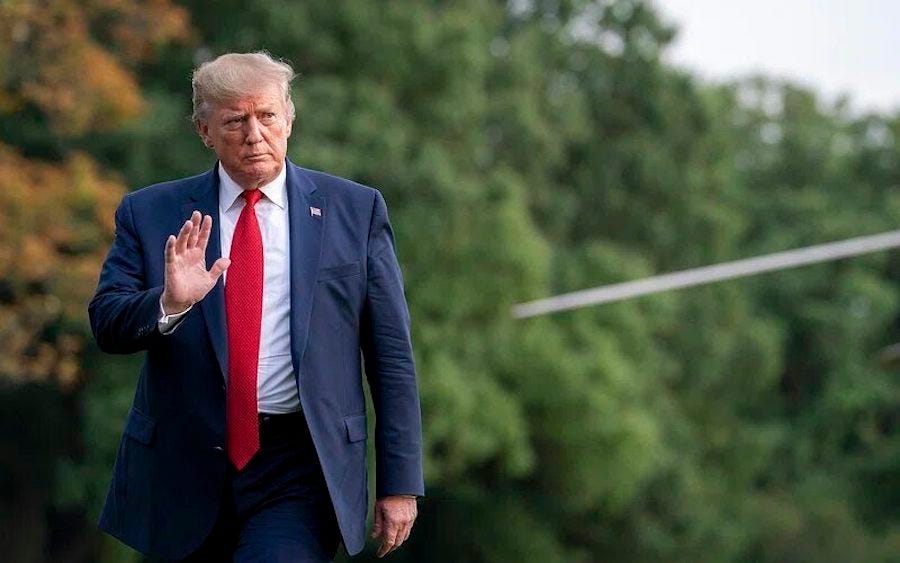
“Trump Trade” soars in aftermath of Tuesday’s elections
U.S. stock futures spiked after Donald Trump’s presidential win over Kamala Harris, with the Dow Jones gaining 3.4% and the Russell 2000 jumping over 5%. Investors appear optimistic about a pro-business environment under Trump and a Republican-controlled Senate, fueling gains in financial stocks.
read more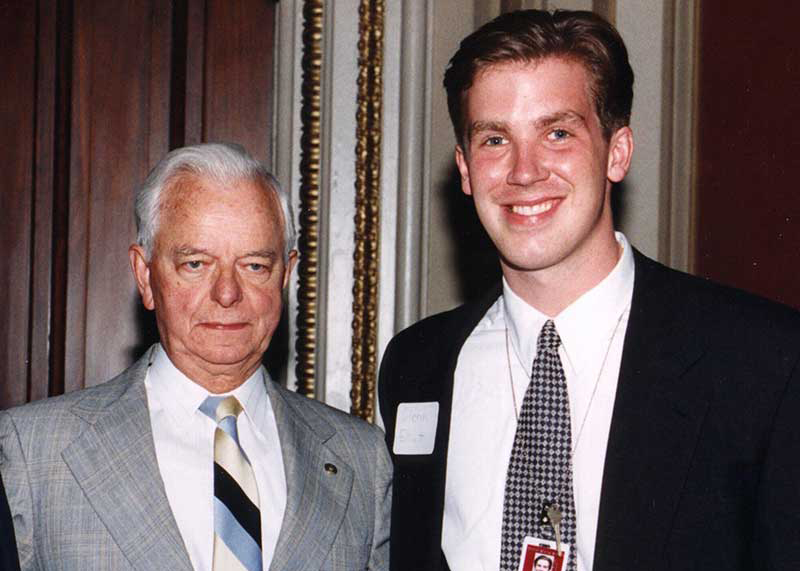
A Q&A with Democratic West Virginia senate candidate Glenn Elliott
West Virginia Democrat Glenn Elliott is running for a U.S. Senate seat that his party has held since 1959. In a state where Democrats have rapidly lost power in recent years, forecasters expect Republicans to flip it in a landslide.
read more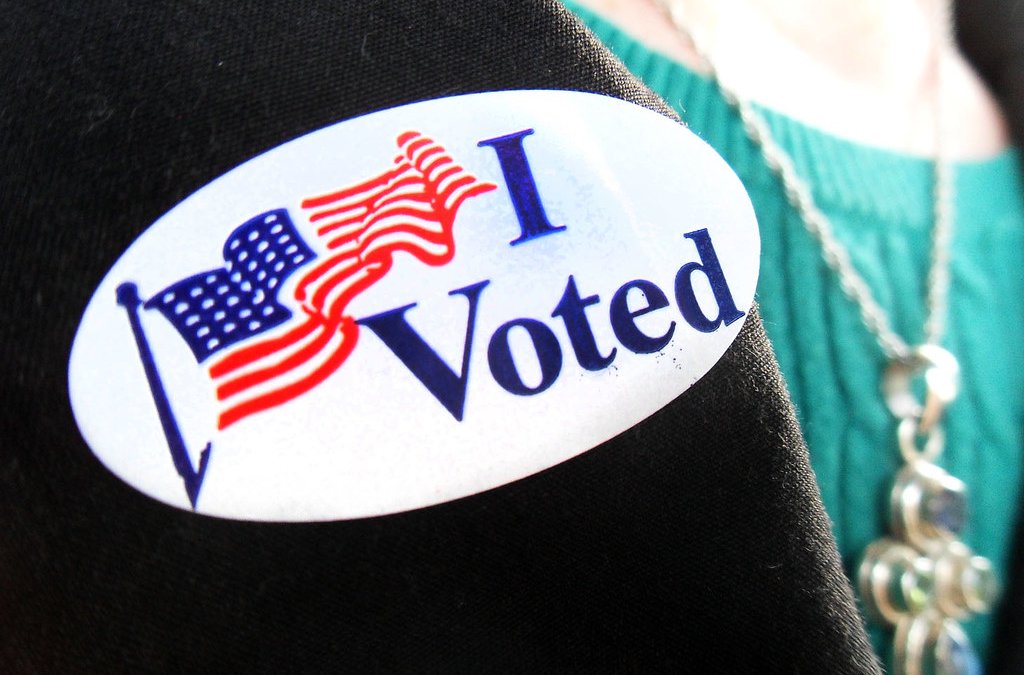
Live updates on Election Day 2024
Medill News Service reporters provide live updates from polling places across Maryland and Washington on Election Day. These reports are published in conjunction with the Washington Post. 6:07 p.m. - Few voters feel strongly towards Alsobrooks By Ananya Chag...
read moreCould voter ID laws backfire on Republicans?
In the four years since former President Donald Trump’s unsuccessful attempt to overturn the 2020 election through false claims of voter fraud, Republicans across the country have intensified efforts to enact new restrictions on voting they argue will strengthen election security.
Georgia’s Election Integrity Act of 2021 drew special attention for its provisions that some viewed as suppressive, including sections substantially narrowing the window for voters to request a mail-in ballot and requiring additional identification for absentee voters. President Joe Biden led a chorus of Democratic officials sounding the alarm on the Georgia law, calling it “Jim Crow in the 21st century.”
North Carolina and Wisconsin, two other swing states, also have strict voter ID laws on the books from Republican-backed legislative initiatives. While Wisconsin’s dates back to 2011, North Carolina only began implementing its legislation in 2023, when the state Supreme Court overturned its own decision that had struck down the 2018 measure for racial discrimination.
According to Marjorie Hershey, a professor emeritus of political science at Indiana University, Republicans theorized that “less educated people and low-income people are more likely to vote Democratic, and because they are the least likely to vote overall, the tougher you make voting the more likely you are to exclude them from the final results.”
Yet, in the build-up to the 2024 presidential election, polling has consistently shown Trump leading among infrequent voters and those without a college degree.
A recent NBC News poll found that Vice President Kamala Harris has a 14-point advantage over Trump among white college graduates, while Trump led by 32 points among white voters without a college degree — margins that mirror Biden’s estimated splits against Trump in 2020.
New York Times/Siena College polling from before Biden dropped out of the race showed Trump leading by 10 points among voters who had never previously voted in a primary or midterm, while Biden had a 4-point edge with all other voters.
Given that low-propensity and non-college-educated voters have shifted toward the Republican Party, some have suggested that voter ID laws may now benefit Democrats. Journalist Matthew Yglesias recently made that case in a post on X (formerly Twitter). “Liberals have been slow to wake up to the fact that the low-propensity voters are now Republicans and there’s no reason to take an unpopular stand against voter ID laws,” Yglesias wrote.
Could voter ID laws in fact shut out votes from an increasingly important demographic within Trump’s base?
“Republicans have spent so long trying to make it difficult for people to vote, and yet now it’s almost turned around to the point where irregular voters lean more Republican,” Lakshya Jain, co-founder of the election forecasting website Split Ticket, said. “It’s definitely one of the stranger things I’ve seen.”
However, Jain said it was hard to conclude what the practical impact of the laws would be. “It really depends on how targeted these [laws] are in terms of effects by race,” Jain said. “If these disproportionately impact Black people, you’re going to get a pro-Republican effect.”
The question of whether voter ID laws impact overall voter turnout has been studied by political scientists for years, but little conclusive evidence has emerged.
“It’s been a very controversial topic in political science,” Marc Meredith, a professor of political science at the University of Pennsylvania and senior analyst on the NBC News Decision Desk, said. “While there may be important effects of voter ID laws on certain individuals’ ability to vote, there is not much evidence that the typical voter ID law has much of an effect on aggregate turnout.”
Meredith said examples of voters who might struggle to vote under new restrictions include students in states where student IDs are not considered valid voter IDs (such as Arizona, Ohio and Texas) and individuals who recently moved to a state but haven’t yet obtained a driver’s license. “Many of these variables are not that clearly tied to party in the first place,” he said.
Meanwhile, Hershey mentioned the existence of studies that found turnout increasing among groups who perceived they were being suppressed because, she said, “those folks get pissed off.”
To the extent that voter ID laws do suppress the vote, Hershey said, pollsters are not cleanly capturing the political sentiments of those who would be most affected because the “non-college” category still encompasses a wide range of educational experiences and income levels.
“Those folks at the very bottom of the educational scale and the income scale tend to still vote Democratic,” Hershey said. “It’s just they don’t vote very much.”
Both parties remain desperate to turn out voters who lean in their direction ideologically but rarely engage in politics. While the extra hurdles introduced by recent election laws may present a risk for Republicans, their ultimate impact remains unclear.
Deep Dive: Analyzing the 2024 Latino Electorate
WASHINGTON — Following a week of fallout from incendiary comments about U.S. Latinos, both Democrats and Republicans scramble to curry the favor of Latino voters from across the country. Kamala Harris and Donald Trump have created Spanish-language advertisements, campaigned with Latino celebrities and courted voters in their local cultural hubs, all in the final months of their presidential campaign. Still, the question remains: how well do they understand this crucial voting bloc?
According to the Pew Research Center, Latinos are the second-fastest growing ethnic group in the 2024 electorate. An estimated 36.2 million Latinos are eligible to vote, amounting to 14.7% of the U.S. electorate this year.
Latino voters are instrumental in the upcoming presidential election because of their significant presence in several swing states, including Arizona, Nevada and Pennsylvania. In Nevada, almost one in every five registered voters is Latino, according to the NALEO Educational Fund. In Phoenix last week, Harris campaigned with norteño band, Los Tigres del Norte, to attract the state’s Latino voters, who make up 25% of the electorate.
The efforts have not been one-sided in the least. Trump returned to Allentown, Pennsylvania last week with the support of Puerto Rican community members and officials to make up for the offensive comments made by comedian Tony Hinchcliffe in his Madison Square Garden rally,
Although Latino voters have historically supported Democrats as a demographic bloc, the Latino electorate’s diverse national, racial and immigration backgrounds have led to the development of an increasingly fractured group of voters that experts are grappling to understand.
Estuardo Rodriguez, who attended and spoke at a panel for Florida International University’s Latino Poll Release on November 1, said his experience as president and advocate for the National Museum of the American Latino has shown him a more nuanced view of U.S. Latinos.
“I have seen and witnessed such division within our community as it comes down to what our origin stories are,” said Rodriguez at the panel.
While Latino voters tend to have a more favorable view of Harris than Trump, it is not necessarily due to Trump’s divisive rhetoric on Latino immigrants and citizens, which have long been staples of his campaigns.
An October New York Times/Siena College poll found that two-thirds of American-born Latino voters and half of foreign-born Latino voters said they did not think Trump was referring to them when he spoke of immigrants.
Professor Eduardo Gamarra, who led FIU’s panel and is director of the poll, said the trend may be due to the longterm establishment of Latino communities in the U.S.
“What we’re seeing now is that there are some very significant generational features to the vote, that as you become more ‘American’ you tend to be more like the general [American] public,” Gamarra said at the panel.
Experts have also surveyed Latino voters’ attitudes on immigration due to their more recent immigration history and shared cultural ties with incoming immigrants from Latin America.
However, policy experts establish that Latino voters are prioritizing the domestic economy and day-to-day issues this election over matters of immigration.
“Immigration is actually a top issue, but at the end of the day, you have to pay the bills and you have to feed your family,” UnidosUS senior immigration policy advisor Cris Ramón said.
Although some polls have come out saying that more Latinos are starting to support mass deportations of undocumented migrants, Ramón said that they do not adequately represent the electorate due to the lack of proposed alternatives in the questioning.
Ramón clarifies that Latinos tend to prefer other border management strategies over mass deportations, including working with Latin American countries to prosecute human smugglers, take in asylum seekers and provide routes for in-region processing of immigrants.
These trends are consistent even among Republican-identifying Latino voters, who have historically made up around a third of the Latino electorate.
“Even when we look at some of the differences by who based reporting the election… or how they identified by political parties, Latinos who identify as Republicans tend to have a softer stance than Republicans overall with these more punitive measures.” Pew Research Center research associate Luis Noe-Bustamante said.
Another thing to understand about the Latino vote is that it is more limited than the share of Latinos that make up the overall U.S. population. As of July 1, 2022, the U.S. Census counted 63.7 million Hispanics in the country, making up 19.1% of the population as the largest racial or ethnic minority in the United States.
Despite this number, Lydia Camarillo, president of the Southwest Voter Registration Education Project based in Texas, said that voter representation in predominantly Latino areas is often diluted due to various factors.
“One-third of us are too young to vote and a third of us are not citizens. And of the number that can vote, we’re voting at the same respectable level, given that we’re a younger electorate, but there’s not enough of us,” Camarillo said.
Crucially, many Latinos in predominantly Latino areas may also not be sufficiently mobilized by political actors. According to the UnidosUS 2024 Pre-Election Poll of the Hispanic Electorate, about 55% [CQ] of Latino voters have not been approached by any political party, campaign or nonpartisan organization to vote in the 2024 election. The lack of outreach was consistent among both competitive and noncompetitive states.
Parties that have focused on outreach and cultivated Latino support have found success through campaigns specifically tailored to their constituents’ national and cultural origins.
Sonja Díaz, founder and leader of the Latina Futures 2050 Lab, noted that the South Texas Rio Grande Valley’s uptick in conservative victories was due to the Republican Party’s courting of Mexican American voters on traditional Mexican values of “God, family, and country.”
“Latino voters are like other American voters in that they have distinct and different views that are based on mobilization that is targeting them in language, culture and policy issues that are particular to their experience,” Díaz said.
Latino voters in the Valley may have also voted Republican in recent years due to the politically dependent nature of their professions.
“There is a percentage of Latinos that work for the Immigrant and Naturalization Service, Customs and for the oil industry, and believe that the only way they get to keep their jobs is to simply vote for the Republican Party,” Camarillo said.
Indeed, Latino demographic experts say the outcome of the election will also rely on a crucial group – U.S. Latinas. In an election increasingly defined by gender disparity, high-propensity female voters are expected to turn out in droves.
According to an October AP-NORC poll, Hispanic women voters are more likely to have a positive view of Harris than their male counterparts, who have been increasingly wooed by Trump’s messages of machismo and American patriotism.
Díaz sees high-propensity Latina voters to have an outsized impact on their communities due to the cultural multi-generational living of many Latino families.
“The zone of influence goes beyond a nuclear family and includes an extension of other family members who look to Latina breadwinners as trusted messengers for information,” Díaz said. So, keeping all of these factors in mind, is it certain that Latino voters will decisively vote for one party or one candidate over the other? At this point, experts are watching for the Election Day turnout, especially since the FIU report states that over 80% of Latinos say they are “very likely” to vote on November 5.
College political organizations mobilize voters in swing states
WASHINGTON — Youth voter turnout has historically lagged behind that of older generations, but this year a new force has emerged to help engage youngsters — including first-time voters — to turn out for the election. College students themselves have pushed others on campus to become more politically active and to vote.
For students who are part of undergraduate political organizations, the work began on campus. Eunho Jung, the secretary of the University of Pennsylvania Democrats, said her organization tabled on the main campus pathway, Locust Walk, with other non-partisan voting organizations “almost every single day” from when students returned to campus up until Pennsylvania’s voter registration deadline of Oct. 21.
“If you ask any UPenn student, they will tell you that they haven’t been able to walk through Locust Walk without being asked if they’re registered to vote in Pennsylvania,” Jung said.
Beyond ensuring that students are registered to vote, student political organizations have also been working to promote the candidates they support or endorse through creative means.
“We are approaching students and offering them literature on Republican candidates at all levels,” said Matthew Trott, president of the University of North Carolina at Chapel Hill College Republicans. “We’ve given out several hundred flyers for different Republican candidates and engaged a similar number of students.”
Tess Phillips, the secretary of College Democrats at Michigan State University, said her organization has also been printing literature — but delivering them straight to students’ dorm rooms through a strategy called “dorm storming.”
“We send out our members and they drop [literature] off at each dorm room, sliding it under the doors of every dorm. Our goal is to hit as many dorms as we can before the election,” Phillips said. “It’s a really great way of being able to give kids information without extending our resources or having to have all these in-depth conversations.”
Her organization has also leveraged a social media presence with over 2,800 followers on Instagram to reach a Generation Z audience, filming short-form content with campaigns.
“That’s been a really cool, unique feature specifically to target young voters that doesn’t necessarily hit the same kind of effect that it would for older constituents that are living around our area,” Phillips said.
However, student political organizations have also made efforts to connect with constituents outside of campus, employing strategies such as doorknocking, canvassing and phone banking to get the word out about the candidates and policies they support.
Trott said he sees differences in the policy concerns older constituents have versus students.
“In our conversations with students, the number one issue has been the economy,” Trott said. “Whereas in the community, it has varied a lot, and can include things like education, crime, immigration, all sorts of things.”
Organizations located in swing states also have had the unique opportunity to meet political heavyweights and hear them speak, including the presidential and vice presidential candidates. Indeed, the University of Pennsylvania Democrats were able to meet Vice President Kamala Harris on Sept. 19 and her running mate, Tim Walz, on Oct. 25 through campaign events.
“All four [presidential and vice presidential] candidates have visited Pennsylvania the most out of any other swing state,” Jung said. “We got so lucky.”
However, Trott says that the flip side of residing in a swing state is the amount of work organizations need to put in to secure votes for their candidates.
“If we were not in a battleground state, I doubt we’d be doing as much, because here we just have to work so much more to ensure that we can win,” he said.
Swing state or not, Phillips recognizes a need for students to vote.
“This is going to be a monumentally close election, and that’s why I feel that any effort we can do to even just get kids registered to vote, to get them to the polls, is going to make a huge difference,” she said.
Trott agrees with the sentiment that youth voter turnout must rise.
“We are the ones who will soon end up inheriting the nation, and we need to make sure that our values are represented at the ballot box and in our candidates,” he said.
Outrage over comedian’s anti-Puerto Rico remarks at Trump rally sparks calls for voter mobilization
WASHINGTON — At Donald Trump’s rally at Madison Square Garden Sunday, comedian Tony Hinchcliffe’s set overshadowed the lineup of warm-up acts, drawing sharp criticism for a series of jokes that targeted various communities, including incendiary remarks about Puerto Rico.
His comments, which likened Puerto Rico to “a floating island of garbage” and perpetuated stereotypes about Latinos, have sparked outrage across party lines and could mobilize the Puerto Rican voting bloc in swing states as they seek to respond to the divisive rhetoric.
According to 2020 U.S. Census Bureau estimates, more than 470,000 people of Puerto Rican descent live in Pennsylvania, with 132,000 in North Carolina and 124,000 in Georgia. Tens of thousands more are in Arizona, Wisconsin, Nevada, and Michigan —all key swing states that could influence the upcoming election.
Although Puerto Ricans living on the mainland make up a small percentage of the U.S. voting age population, political scientist Carlos Vargas-Ramos, Director of Public Policy at the Center for Puerto Rican Studies at Hunter College, said they can be crucial in swing states.
“In crucial battleground states, for instance, Pennsylvania, the citizen-eligible population that is Puerto Rican represents three percent of the electorate, which in a state that is divided 50-50 or 48-48 can be very significant,” Vargas-Ramos said.
Lori McFarland, chair of the Lehigh County Democratic Committee in Pennsylvania, said that when it comes to this election, the weight of the world is on their shoulders.
Allentown, the county’s largest city, is located just 60 miles from Philadelphia and home to 34,000 Puerto Ricans. Following the controversial comments by Hinchcliffe, Trump campaigned in Allentown on Tuesday, aiming to regain voters he may have alienated.
McFarland said that her priority is to help mobilize her community to the polls as she believes the recent remarks have ignited a renewed passion amongst voters.
She pointed towards recent segments on La Mega Radio, a local Spanish-language radio show, as evidence of shifting mindsets. In an interview with CNN, La Mega host, Victor J. Martinez said that on his show, he received a call from a Puerto Rican listener who said that after the Madison Square Garden rally he was ashamed of his decision to vote for Trump by mail, and is now putting his anger towards encouraging his friends and family members to vote for Harris instead.
Puerto Rico and Voting History
The incident has brought Puerto Rican voters into the spotlight. But the history of Puerto Rican voting rights has always been complicated.
The U.S.-Puerto Rican relationship traces back to the U.S.’s acquisition of the island as a territory following the Spanish-American War of 1898. The U.S. government granted Puerto Ricans U.S. citizenship in 1917 through the Jones-Shafroth Act, yet the island contentiously remains a U.S. territory.
Today, around two-thirds of Puerto Ricans live in the mainland U.S. With state residency, Puerto Ricans are eligible to vote for U.S. president and members– a citizenship right those living on the island do not share.
Professor Amílcar Antonio Barreto, chair of the Department of Cultures, Societies and Global Studies at Northeastern University, said Puerto Ricans’ complicated voting rights are a product of the American federalist system.
“There’s your citizenship, but to fully exercise your citizenship, you have to live in a state, not a territory,” Barreto said.
Since Sunday, Puerto Rican figures in all areas of influence, including religion, politics and music, have denounced the offensive comments, even if they are ineligible to vote for U.S. president.
Notably, Puerto Rican reggaeton star Benito Martínez Ocasio, known as Bad Bunny, reposted a video of Vice President Kamala Harris’ policies for Puerto Rico to his 45.7 million Instagram followers soon after Hinchcliffe’s set.
Jennifer González-Colón, Puerto Rico’s Resident Commissioner, responded to the comments, calling them “despicable, misguided and disgusting.”
González-Colón, who is the sole Congressional representative for the island and a Republican, said the comments “do not represent the values of the GOP.”
The comments were a heavy blow to Republicans and their mobilization of more conservative Puerto Rican voters.
Barreto called Hinchcliffe’s gaffe “a classic shot in the foot” for a campaign intent on expanding their voter base and courting Latino voters in competitive states.
“He needs to keep his base happy with red meat, and anti Puerto-Rican rhetoric is just the thing that many in his base want to hear,” Barreto said.
Vargas-Ramos said the “garbage” comment, which stood in sharp contrast with Harris’ release of a plan to increase economic opportunities for Puerto Ricans, was a “missed opportunity” for Trump to attract Puerto Rican voters with policy.
While there’s little that can move the needle in the final days leading up to the election, experts agree that provoking Puerto Rican voters could make an impact.
“It holds out the possibility that people, out of sheer anger, will go out and vote, which in a tight election, could make a big difference,” Barreto said.
Point by Point – Episode 4: Trump vs. Harris on Reproductive Rights
In this fourth episode of Point by Point, we examine the sharp divides in abortion policy between former President Donald Trump and Vice President Kamala Harris. With insights from legal expert Amanda Barrow, we dive into the consequences of overturning Roe v. Wade, Trump’s potential avenues for a national ban, and Harris’s push to preserve reproductive rights protections.
Join us as we unpack how these candidates’ stances could shape the future of reproductive health in America.
Listen here:
Harris criticizes Jan. 6 attack in closing argument speech amid concerns over political violence
WASHINGTON — Vice President Kamala Harris led with criticism of former President Donald Trump’s involvement in the Jan. 6, 2021 attack on the Capitol in her closing pitch to the American people on Tuesday, with a week to go until election day.
Harris gave a 30-minute speech at The Ellipse, the same site at which her Republican opponent spoke and incited the mob on Jan. 6. She urged the crowd to remember the violence and to think clearly about “who Donald Trump is.”
“[Trump] sent an armed mob to the United States Capitol to overturn the will of the people in a free and fair election,” Harris said, within her first five minutes at the podium. “An election that he knew he lost.”
Her comments echo a growing sentiment among voters that aggression over election outcomes may ensue. According to an October Pew Research Center survey, 66% of registered American voters say the threat of political violence is a major problem in the United States today.
The brother of U.S. Capitol Police officer Brian Sicknick, who died in the January 6 insurrection, also spoke at the event.
“He incited the crowd to riot, while my brother and his fellow officers put their lives at risk,” Craig Sicknick said. “Now, Mr. Trump is promising to pardon the convicted criminals who attacked our Capitol, killing my brother.”
Political violence has posed a threat in every election, but this risk has been significantly exacerbated by recent rhetoric, according to Jacob Ware, a research fellow who focuses on terrorism and counterterrorism at the Council on Foreign Relations.
“We are going to see election violence this year. We are in an elevated threat environment, and it is very likely to lead to violence,” Ware said.
He added that both candidates’ “existential language” about the stakes of the election is problematic, as they have staked out a position that “if we lose this election, there won’t be another election in this country.”
Ware also said that the political right has wielded uniquely violent and incendiary rhetoric, referencing a March 2024 comment by Trump at an Ohio rally that there would be a “bloodbath” if he isn’t re-elected.
“What it really creates is a permissive environment for violence, where when attacks happen, it’s almost been already excused, and so that is very dangerous,” Ware said.
Trump responded after the March rally by saying that he only used the word in reference to economic outcomes if defeated in the November election.
The former president also responded to Harris’ Tuesday speech in a post on X shortly after the event. “While I am running a campaign of positive solutions to save America, Kamala Harris is running a campaign of hate,” Trump said. “She has spent all week comparing her political opponents to the most evil mass murderers in history.”
Karoline Leavitt, Trump campaign national press secretary, criticized Harris as “lying, name-calling, and clinging to the past.”
Harris’s supporters in the crowd expressed concern about violence from Trump’s supporters after the election if she wins.
“I had a friend whose nephew was actually in the Capitol Police, who was there [on January 6], and it was extremely frightening,” said Debra Sprague, a Harris supporter and Associate Professor at George Mason University.
She recalled the shock of watching the riot unfold almost four years ago.
“I just couldn’t believe that that would happen in America, that we would be at a point where democracy is on the cusp of dying.”

